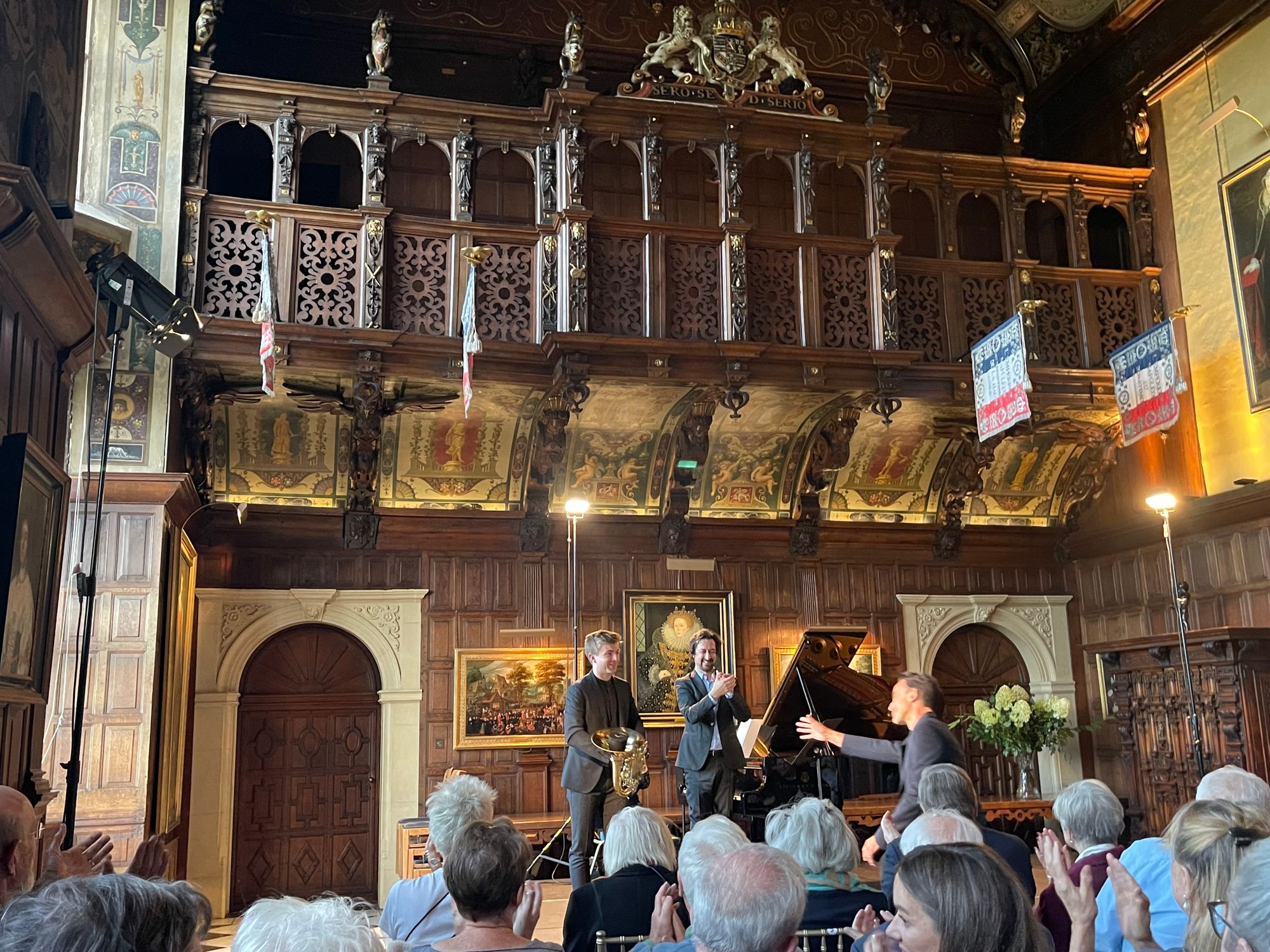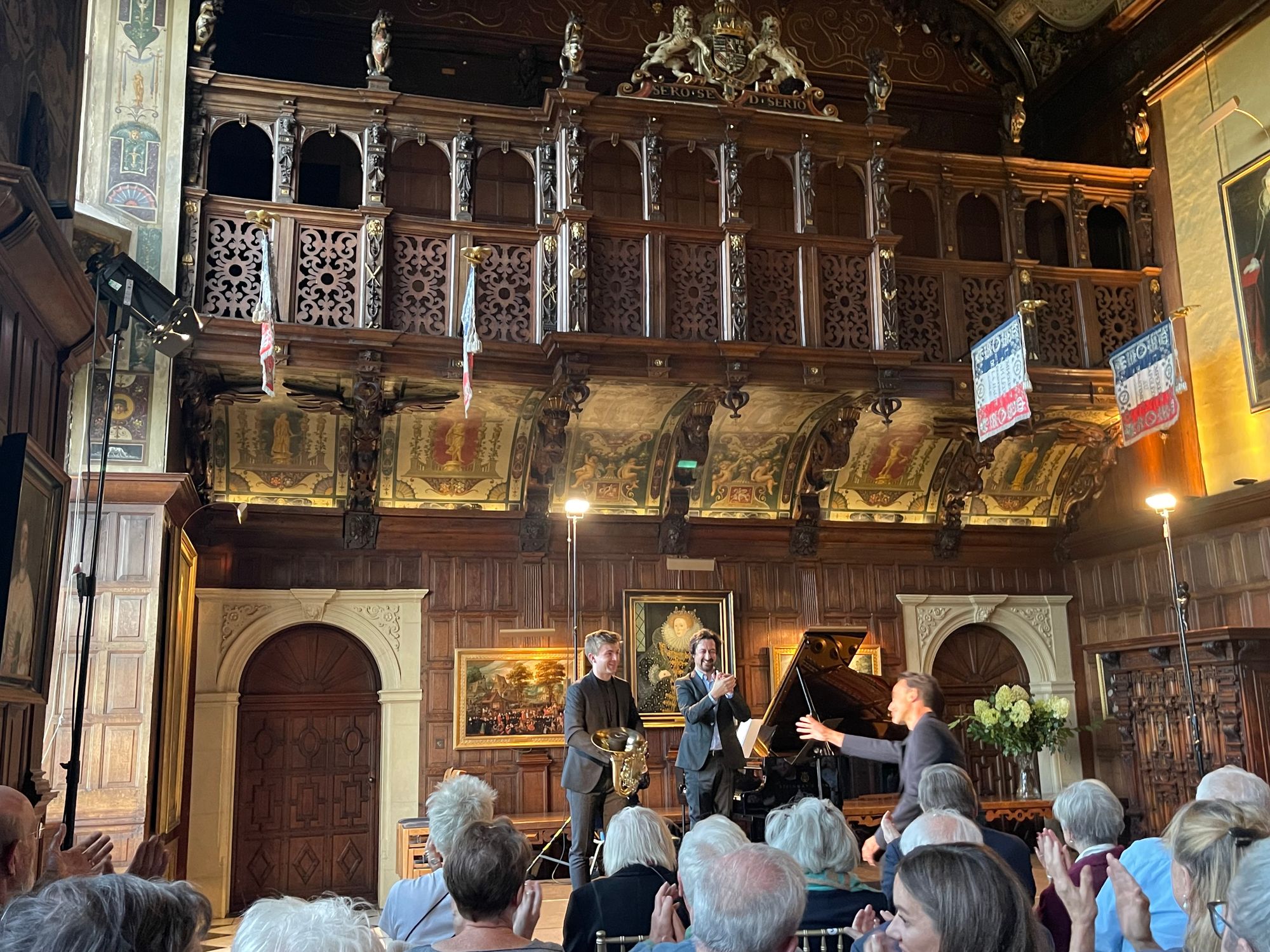Hatfield House: the Hertfordshire gem

The Hatfield House Chamber Music Festival has been in existence for over a decade now - this is its 12th incarnation - and offers music making at the highest standards in beautiful surroundings. Beautiful in and out, one might say: the venues inside Hatfield House are almost as lovely as the coiffured gardens without. Almost.
Ben Goldscheider is the great hope of British horn playing right now, He performed at the Critics’ Circle Awards recently in an Elena Langer premiere, Love Song to Aminta (from a poem by Aphra Behn). This really is a lovely piece, performed by Goldscheider with fellow Critics' Young Talent (Music) award winners Ossian Huskinson (bass-baritone) and pianist Thomas Kelly:
.
The programme for Friday's recital was as follows:
Schumann Phantasiestuücke, Op. 88 (1842)
Joseph Phibbs Horn Sonata (2023, World Premiere)
Brahms Horn Trio in E flat, Op. 40 (1865)
Ben Goldscheider horn
Magnus Johnston violin
Guy Johnston cello
Tom Poster piano
Although billed as a 'Horn Recital,' the performance began with Schumann's Phantasiestücke, Op. 88 for piano trio, performed by Tom Poster, Guy Johnston and Magnus Johnston. The venue was the Marble Hall of Hatfield House - a beautiful, picturesque space which is nevertheless very resonant. Detail did get blurred, but set against that was the radiant lyricism of the opening 'Romanze,' the lightness of touch of the 'Humoreske' (acoustic notwithstanding), proper chamber music intimacy in the 'Duett" and a real sense of grandeur indeed, some would say swagger) in the finale.
Here is a version featuring Martha Argerich, with rolling score (movement timings if you follow the link are: 00:04 Romanze; 02:29 Humoreske; 09:04 Duett; 13:16 Finale).
I first came across Joseph Phibbs and his music at a VOCES8 recording session in London. His music has a strong voice, and it is clear he thinks long and hard an harmonic structure both on immediate and global levels. His Clarinet Concerto was recorded by Mark van der Wiel (of Philharmonia Orchestra fame) with, indeed, the Pihlharmonia and Christopher Warren-Green. Many things come across in that piece - one of the primary elements is Phibbs' ability tto write so well for his chosen instrument. Not just in technical terms - his music fits the characteristics of the instrument so well, too (you can hear this in the agile passages in the first movement of his Clarinet Concerto).
The new piece, his Horn Sonata, was receiving its World Premiere. He begins this five-movement piece with strong, declamatory statements perfectly suited to the horn. Both Britten (whose Serenade for tenor, horn and strings is such a staple of the repertoire) and Brahms (whose Horn Trio we heard as the final item) hover over this work - in fact, Phibbs directly quotes a snippet from the Brahms (most obviously when the horn player walks across the stage to play into the piano's open lid, a moment of true magic). I do wonder if there is at the very least a nod to the Britten, too, in the neighbour note, keening figures in the fourth movement (a reference to the movement in teh Britten that holds the preilous sustained top C). One heard a Brittenish element to the piano harmonies inteh first movement, too.
Unfortunately without a score I cannot say if the vibrato on the horn in the first movement is notated, expressive, or nerves. Nevetheless, Phibbs does use effects well, and he is lucky to have a player such as Goldscheider who can play hand-stopped notes both rapidly and accurately in the second movement (where the piano part seem to veer towards Hindemith). Again, references are perhaps shadowy or perhaps invented by the listener: posthorn gestures sent this listener's mind spiralling towards Schubert's 'Die Post' from Winterreise.
Phibbs' piece is essentially five character pieces (linking it, then, to the Schumann): an Aubade, a Rondo (Notturno), a Cantilena, an Elegy, and a concluding moto perpetuo, this last almost a throwaway afterthought. There are so many impressive moments: perhaps a word for Tom Poster's playing, not only throughout but particularly the way he set up the absolutely shimmering atmosphere in the third movement.
This is an impressive piece, and one really does hope it established itself in the repertoire.

Finally, Brahms’ magnificent Horn Trio, written in 1840 and written in the shadow of the death of the composer's mother. Both Brahms and Phibbs have a complete idea of what they want from their forces; both have a complete grasp of writing for the horn (no easy task, as anyone who has participated as a horn player in composition workshops will attest).
The work begins with the violin stating the melody - Magnus Johnston's sound was beautifully burnished and warm. Sitting violin and horn directly opposite each other makes perfect sense (indeed one wonders if this piece is where Ethyl Smyth got her idea for her Concerto for Violin and Horn from ... perhaps not such a wild idea when one reads Janiece Marie Ludeke's dissertation at Louisana State University (1998) - a "performance guide for the hornist". The dissertation can be found in full here.
The present performance of the Brahms held a spacious first movement, warm, inviting against a properly rapid-fire, almost galloping Scherzo, a superb performance full of internal fire. The penultimate movement, an Adagio mesto is, like Phibbs' penultimate 'Elegy,' the emotional heart of the work, and spoke viscerally here, particularly when Brahms thins the texture to just violin and horn, a lonely, discombobulated moment of pure desperation.
On a technical level, one gets so used to the sheer stratospheric standard of Goldscheider's playing that when things go even a touch awry it shows His attack of notes is supremely calibrated - just a couple of attacks in the Adagio didn't go quite to plan. Yet how the hunting finale romped its way home All three players clearly had a ball (as did we, the audience).
Goldscheider did play this on modern, valved horn. Brahms' Trio was intended for natural horn (‘Waldhorn’) though. Here’s a performance not only wih natural horn but also with fortepiano via three stellar performers, violinist Isabelle Faust, fortepianist Alexander Melnikov, and horn player Teunis van der Zwart. There is a scrolling score on the video:
As far as the concert is concerned, this was pure chamber music in a glorious setting.
Goldscheider will play the Brahms Trio on Sunday, December 17 at London's Wigmore Hall with Callum Smart (violin) and Richard Uttley (piano): full details here.
